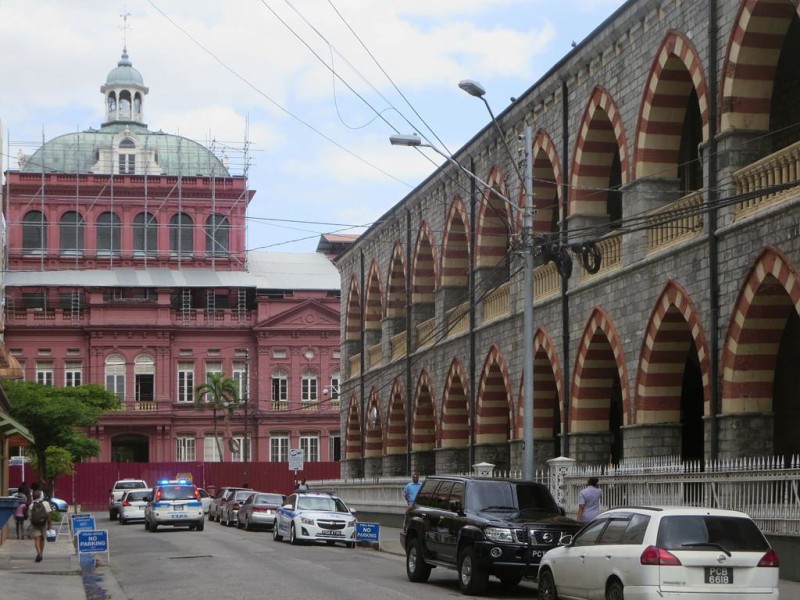
The Red House, the former seat of parliament in Trinidad and Tobago. Parliamentary sittings have been moved because of renovations to the building. Photo by David Stanley, used under a CC BY 2.0 license.
Demonstrators gathered outside of Trinidad and Tobago's parliament in Port-of-Spain to protest a proposed Constitutional Reform Bill that would among other things place a ten-year term limit on the office of prime minister, create the right to recall members of Parliament, and require automatic run-offs when no candidate has more than 50 percent of the vote.
With general elections due next year, some suggest that it is an attempt to boost the government's approval ratings before citizens go to the polls, while others see more sinister motives. There is growing skepticism over the run-off vote amendment in particular, with concerns that it could make tribal voting more entrenched and allow the two-party system to thrive. The country's Elections and Boundaries Commission (EBC) has already stated that any run-off votes would also add to the expense of a national election.
The controversy became further entangled when Dr. Merle Hodge, who was a member of the Constitutional Reform Committee, denied that the run-off provision had been part of the discussions, which led to a back-and-forth with Attorney General Anand Ramlogan. Ramlogan challenged Hodge's change of heart, considering she had already signed off on the bill, but Hodge maintained that the run-off clause had not been included in the public consultations on constitutional reform. The EBC also said that it had not been consulted about the run-off amendment.
The bill was passed in the Lower House of the Parliament, despite the fact that two members of the government, Foreign Minister Winston Dookeran and Minister of Public Administration Carolyn Seepersad-Bachan, voted against it. On Tuesday, it went to the Senate as a tabled item, but it was not debated. The debate is scheduled for the following Tuesday, Aug. 26.
To convolute the situation even further, President of the Senate Timothy Hamel-Smith was privately lobbying for the bill to pass. Once this came to light, he was called upon to recuse himself from the proceedings. Instead, Hamel-Smith left the country on vacation, making his judicial disqualification a moot point. A government senator will take his place at Tuesday's Senate hearing, which leaves the government with one less vote of support — it will therefore need at least two independent votes of the bill is to be approved by the Senate. Those independent senators have therefore been the target of many of the protesters, who are pleading with them to block the bill in its current form.
Blogger and activist Attilah Springer was among those who gathered in front of the Parliament. She promised to continue protesting:
In as much as I am anti-establishment and mostly uninterested in displays of nationalism, it was telling that as we sang the anthem at the adjournment of the sitting of the Lower House at which the Constitution (Amendment) Bill 2014 was passed just after 4.00 this morning, the UNCites [supporters of the United National Congress, the main political party in the current People's Partnership coalition government] didn’t see it necessary to stop their exit from the building to stand at attention. They kept walking, as if we needed any more proof of utter lack of respect for the country and the people.
Anyway, we’ll be back out in front of Parliament […] every day until the Senate sitting next Tuesday. Everyone needs to petition the independent senators. A document is being prepared that outlines why this Bill must not be made law to be distributed to people who want more information.
Political blogger Rhoda Bharath watched the debates in Parliament on television and gave a rundown of her observations, criticising the government for not adopting the system it seeks to enshrine in the Constitution:
Proportional Representation was raised often last evening, notably on the side of the Government. MP [Minister of Parliament] after MP from the COP [Congress of the People, a political party that comprises the current coalition government] and the UNC mouthed the words. They want to bring Proportional Representation to the country, to the electorate […] Has anyone noticed that neither of these parties use Proportional Representation for their internal elections?
The PNM [People's National Movement, which currently occupies the opposition bench in Parliament] internally implemented One Man One Vote, which fits in better with a First Part the Post System that they advocate at the national level. Yet both the UNC and the COP want PR, and won’t implement at the micro level, so that we can see how it will work for us at the macro level. Isn’t that weird?
When the bill is debated in the Senate of Trinidad & Tobago this coming Tuesday, it is expected that both protesters and supporters will be there in full force.







2 comments